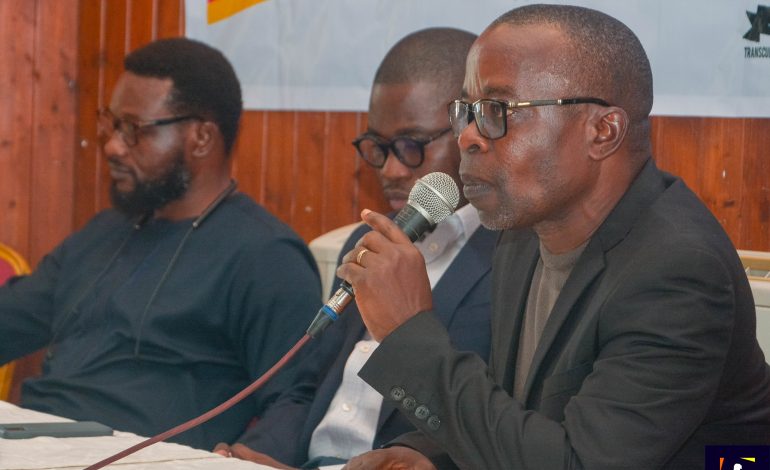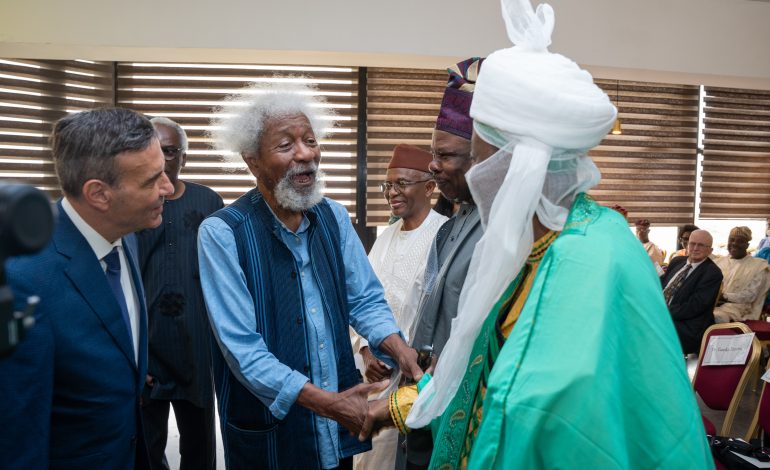Collaboration, market differentiation as approaches to sustainable book distribution challenge, experts say

‘Authors are distant from booksellers in Nigeria’
‘Distribution in the book value chain is dysfunctional at the moment’
By Godwin Okondo
AT one of the panel sessions of Day 2 of Network of Book Clubs and Reading Culture Promoters in Nigeria’s (NBRP) third National Conference and AGM held from 27-28 September 27 and 28, 2023, discussants focused on ‘Approaches to Resolving Books’ Availability and Distribution Challenges’. Panel members included writer and Chairman of Association of Nigerian Authors (ANA), Lagos, Mr. Ifeanyichukwu Avajah, two booksellers – Director of Library Services and Books Consultancy of Leverage Business Academy, Mr. Henry Itauma and co-founder of Roving Heights Bookstore, Mr. Dotun Eyinade. Moderating the session was writer, journalist and founder of online news platform, TheArtHubNg, Mr. Anote Ajeluorou.
With ‘The Science of Reading and Early Literacy Development: The Role of Parents, Educators, Libraries and Book Clubs” as theme, the conference was held at Julius Berger Hall, University of Lagos, Akoka, Lagos, and had the presence many promoters of reading culture in the Nigerian book ecosystem from across the country.
Ajeluorou opened the conversation by asking Eyinade to share experiences from a previous speaking engagement last year at the Lagos Book and Art Festival (LABAF 2022) where collaboration was stressed as a panacea to making books available to the reading public. Eyinade explained, “Collaboration is one important thing the sector needs. We have a big problem as the distribution of books in the book value chain is dysfunctional at the moment, and the only way to fix this problem is to collaborate. As members of book clubs, I think one of the best ways we can collaborate is by sharing the methods we have tried or tested. We can collaborate to have book reading tours, collaborate with publishers and bookstores and book clubs.
“As booksellers, we should also learn to join resources, and we shouldn’t see ourselves as competitors, but as partners in the book sector. We cannot overstress that need to collaborate and share ideas on what is working, and looking at ways to approach the market together. Nigeria has a big market for books despite the economic barriers, and collaboration is the only way we can take advantage of that market.”

Panel session moderator, journalist and writer, Anote Ajeluorou; ANA Lagos Chairman, Ifeanyichukwu Avajah; co-founder, Rovingheights Bookstore and Secretary, Nigeria Booksellers Association, Henry Itauma
Itauma also shared this opinion on the issue. He said greater collaboration among publishers and booksellers, and the market or booksellers should be clearly marked out, stressing that market segmentation as insurance companies do in dishing out insurance policies to different categories of the insuring market is a healthy way to adopt rather than one bookseller trying to sell all kinds of books that could pose challenge capital-wise.
“There are people dealing with tertiary books, which is a very big market,” he explained. “There are also people dealing with primary and secondary schools’ markets, as well as motivational, business and gospels, and these markets have not been fully explored. We should be able to team up together with those in the tertiary sector and harness advantages from foreign publishers and book fairs, and buy books in bulk. Books for basic sciences, for instance, are the same all over the world, as well as those for medical schools. This is an area where market differentiation can help us.
“We do not have experts because people are splitting themselves selling all kinds of books. We should have experts for tertiary books, and they will harness these books all over the world. Wherever you have order for books, they will get it because they have the knowledge to gather these books and sell them. Harnessing this axis gives us an advantage in different fields of specialization, because the book market is so big. We need market differentiation to help us build capacities and deliver quality and specialized services.”
Avajah brought into focus the challenge the writer faces and agonised over inability of some booksellers and publishers to remit sales or royalties to writers. He said although Nigerian writers are famous or highly celebrated, their fame or celebrity status doesn’t come from proceeds made from sales of their books or royalties from publishers. He threw in the parable of the sower, with writers being the sowers, but who never reap from the literary, book harvest. He wondered how much marketing interest the 11 longlisted books for The Nigerian Prize for Literature 2023, for instance, elicited from booksellers as possible hot cakes, since one out those books, now a shortlist of three, would win USD$100,000! Regrettably, Avajah said, writers, as content creators, held the short end of the stick in Nigeria’s uncertain marketing and distribution book value chain.
“The writer always feel that the harvest never comes, and it may surprise you to know that even the most celebrated writers haven’t made so much from the sale of their books,” Avajah lamented. “The writers are celebrated, but they haven’t really made much from the proceeds of the sale of their books. Sometimes, you take your books to bookshops and you don’t see the money or the books.
“We should establish a system that establishes quality. As the content creators that we are, we’ve been able to create quality books, and set up a system that is able to identify them, like The Nigeria Prize for Literature. Like the authors who made the shortlist, how are they benefitting from booksellers and book marketing? We should celebrate those books across the country, create awareness for them, stage them, and the system will be so structured that the publishers and authors would also smile to the bank.”
But Itauma explained the disconnection between booksellers and mostly self-published writers, who have no idea how to take their books to the right booksellers. According to him, “Authors are distant from booksellers in Nigeria. Books must be categorized. There is nothing like an organized marketing and selling of literature in Nigeria, and the situation is getting a bit more chaotic. There are some shops that might not have these books on sale, but there are people who deal with these books and are doing well with them. ANA should invite the key booksellers so that we can interface with them and have this kind of discussion, so that when these books are published, booksellers can market these books and work with the publishers for those books to be sold.
“However, what we find is that some authors or lecturers would write their books and keep them in their drawers, or try to sell the books themselves. These books are being sought-after by schools and others, but they are nowhere to be found, and these books are sitting in the homes or offices of the writers or lecturers, and when you ask why, they tell you they don’t know where to sell those books.”
Itauma and Eyinade emphasised that unless the distance, and sometimes distrust, are removed through active collaboration between writers and booksellers, literary texts would continue to suffer low or no sales at all. Ultimately, this would compound the woes of writers who should benefit from Nigeria’s huge population that should be assets to writers.
“There are people who are very good at selling literature. I could ask them if I have someone who needs such books to buy, but when they need what I specialize in, they come to me,” Itauma continued. “So, we share information in those areas and we specialize, and that gives us the capacity and advantage to handle requests, and we know who to go to even when we don’t have a book and also refer people.”
Eyinade also made clarification on the issue of disconnection between writers and booksellers in the country, saying, “I think what would be helpful in this book ecosystem is if all the players are able to come together and discuss their key points. When we say Nigerians are not buying books, I believe we haven’t exhausted all the options available to us. We should ask ourselves fundamental questions as to why we can’t make much sales, not saying that Nigerians don’t read and that’s why we can’t sell.
“Concerning those on The Nigeria Prize for Literature shortlist, I feel that sometimes publishers publish books because they are targeting prizes. Self-published writers also reach out to us to help them sell their books, and we ask for copies, put them on our social platforms, and when we sell, we ask for more copies. Things like what to write, how to package a book are what writers should consult booksellers for; we don’t have warehouse for unwanted books. I feel there is a lot more to be done, and I think one of the things I would put as a challenge to the leaders of our sector is to find a means to bring writers, publishers and booksellers together for a dialogue.”
Avajah was enthusiastic about a possible dialogue between both parties. According to him, “I think it would be helpful for us to have this kind of interaction with booksellers, so that authors know the criteria in terms of book quality they should meet, and have some insight from them. With this kind of collaboration, they know we can make provision for newly published books and get advice on outlets where they can be marketed. You can get more fresh content and authors can get more returns.”
A professor of Library Science and Vice President of Network of Book Clubs and Reading Culture Promoters in Nigeria, Felicia Etim, challenged the panel on the exclusion of readers or book buyers from being on the panel. As a lead librarian of over 15 years experience, Etim said establishment libraries, especially university libraries across the country were no longer able to buy books, because of high costs of books and poor allocation for such purpose. Even most university bookshops, she lamented, have regrettably shut down, adding that students also could not buy books because of the spiralling costs of books.



